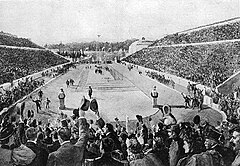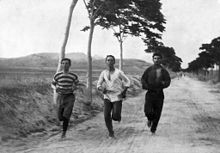Athletics at the 1896 Summer Olympics – Men's marathon
| Men's marathon at the Games of the I Olympiad | |||||||||||||
|---|---|---|---|---|---|---|---|---|---|---|---|---|---|
 Spyridon Louis entering the stadium at the end of the marathon | |||||||||||||
| Venue | Marathon to Athens | ||||||||||||
| Dates | April 10 | ||||||||||||
| Competitors | 17 from 5 nations | ||||||||||||
| Medalists | |||||||||||||
| |||||||||||||
| Athletics at the 1896 Summer Olympics | |
|---|---|
| Track events | |
| 100 m | men |
| 400 m | men |
| 800 m | men |
| 1500 m | men |
| 110 m hurdles | men |
| Road events | |
| Marathon | men |
| Field events | |
| Long jump | men |
| Triple jump | men |
| High jump | men |
| Pole vault | men |
| Shot put | men |
| Discus throw | men |
The men's marathon event was a special race invented as part of the Athletics at the 1896 Summer Olympics programme. Michel Bréal originated the idea of a race from the city of Marathon to Athens, taking inspiration from the legend of Pheidippides. The first such marathon race was a Greek national competition that served as a qualifier for the Olympic marathon; the qualifier was won by Charilaos Vasilakos. The length of the marathon in 1896 was 40 kilometres (25 mi).
Twenty-five athletes traveled to Marathon for the race from there to Athens, though only seventeen actually began the race. Just as in the 1500 metre race, Albin Lermusiaux took the lead early. Edwin Flack and Arthur Blake maintained the second and third places until Blake dropped out at 23 kilometres. At 32 kilometres, Lermusiaux dropped out as well, leaving Flack in the lead. That lead was not secure, however, as Spyridon Louis was making full use of his endurance to gain slowly on Flack.
Exhausted from trying to maintain his pace, Flack dropped out of the race with about three kilometres left. Louis was left alone at the front, finishing the 40 kilometre race in slightly less than 3 hours. Vasilakos finished second, followed closely by Spyridon Belokas and Gyula Kellner. Kellner lodged a protest stating that Belokas had covered part of the course by carriage; the protest was upheld, and Belokas was disqualified.
Results
| Place | Athlete | Time |
|---|---|---|
| 1 | 2:58:50 | |
| 2 | 3:06:03 | |
| 3 | 3:06:35 | |
| 4 | Unknown | |
| 5 | Unknown | |
| 6 | Unknown | |
| 7 | Unknown | |
| 8 | Unknown | |
| – | DNF (37 km) | |
| DNF (32 km) | ||
| DNF (24 km) | ||
| DNF (24 km) | ||
| DNF (23 km) | ||
| DNF (9 km) | ||
| DNF (? km) | ||
| DNF | ||
| DISQ | 3:06:30 |

See also
- Stamata Revithi - A Greek woman who tried to enter the event
References
- Lampros, S.P.; Polites, N.G.; De Coubertin, Pierre; Philemon, P.J.; Anninos, C. (1897). The Olympic Games: BC 776 – AD 1896. Athens: Charles Beck.
{{cite book}}: Unknown parameter|last-author-amp=ignored (|name-list-style=suggested) (help) (Digitally available at la84foundation.org) - Mallon, Bill; Widlund, Ture (1998). The 1896 Olympic Games. Results for All Competitors in All Events, with Commentary. Jefferson: McFarland. ISBN 0-7864-0379-9.
{{cite book}}: Unknown parameter|last-author-amp=ignored (|name-list-style=suggested) (help) (Excerpt available at la84foundation.org) - Smith, Michael Llewellyn (2004). Olympics in Athens 1896. The Invention of the Modern Olympic Games. London: Profile Books. ISBN 1-86197-342-X.
